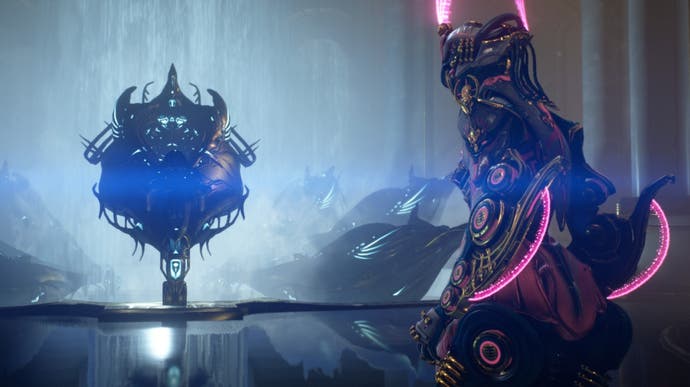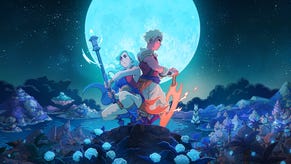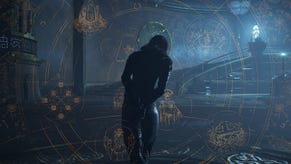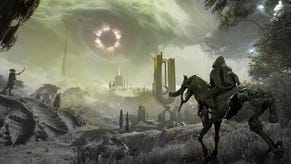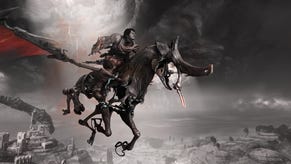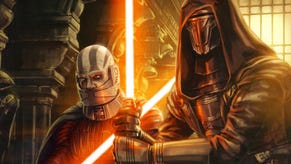Forget Destiny, here's how Warframe makes us care about its space stuff
Nine out of Tenno.
Can you believe Warframe came out a whopping eight years ago, in 2013? It was a follow-up to Digital Extremes' Dark Sector, a third person shooter with a knife frisbee gimmick that got a lukewarm reception (though I myself liked it a bunch). Dark Sector was itself a reimagining of a prototype the team had built for a game set not in a fictitious Eastern European setting but in space, and watching it now, you'll be amazed by how much of the DNA of Warframe was established years before the game ever came out.
The Tenno are there, Warframe's space ninjas and guardians of the solar system, in their strange organic armour. And for years, Warframe wasn't a lot more than that to me. A decent enough action title with a lot of grinding, unlocking new "warframes" to fight in. In my mind it's always sat alongside Destiny. Interesting space settings tethered to a treadmill of rote action. But while I've spent the last year or so giving both of these games another go, amused by certain additions (Destiny's bow is a joy to wield and Warframe's Octavia kills enemies with custom music...how could I not) only one of them has managed to grab me.
So if you're interested in playing Warframe, turn back now. I mean it, massive spoilers ahead. If you're remotely interested in playing it already then you'll be served better by experiencing its story for yourself.
Warframe's story was nonsense to me for many hours. White noise in the background of endless looting and shooting. Which was fine! I was there to be a dumb space ninja DJ, I wasn't caring about anything else. But dozens of hours in, unlocking one planet after another in the game's map, the amount of dialogue from NPCs was not just increasing but suddenly they were having conversations. Warframe never hurt for personality but now, suddenly it was giving me plot threads to pull on. Then, I was given a quest: The Second Dream.
There's a cutscene, characters and a very easy-to-grasp story. Others have written about this elsewhere so I won't go over the details too much but you're tasked with rescuing some important person hidden away. Upon reaching them you discover they are in fact...yourself. The player character isn't the Warframe you've been controlling this whole time but an "operator", controlling the suit of armour from afar. And once you've rescued yourself, and I have to stress this is after dozens of hours of play, the game out of nowhere gives you a character creator.
It reframes (ha) the entire game. The hours of endless grinding as a nameless warrior were the foundation for a story about personhood, about reclaiming identity. Fittingly, the character creator is free of gendered options, simply giving you a full spectrum of customisation for your operator. And notably, the character you're creating is young. Like teenager-looking young. Dozens of games have character creators but withholding it till this far in turns it into a narrative device. Identity and autonomy is at the heart of the game, its heroes just children with a crushing responsibility who are, themselves, perfectly vulnerable now. Its villains are no longer defined by silly names and eccentric performances but by what they represent. Empire and capitalism come to pry away personhood. As you reclaim more of your identity in the quests that follow, the journey for your character is clear. That clarity helped me understand why I repeatedly bounce off other games like it, especially Destiny.
For all the lip service Bungie pays in their trailers and in their cutscenes, declaring Destiny's importance and the stakes of its story, they could not be more disconnected from the player. You are the guardian and what that means isn't much more complicated than "the good guy what shoots stuff". Destiny tells the story of villains and factions but none of them mean anything when what the player stands for is no more than a nebulous concept of "good" and "light". Even when Bungie tries to give personal stakes, as in the Forsaken expansion, it's still really the story of Cayde and Uldren Sov, not the player.
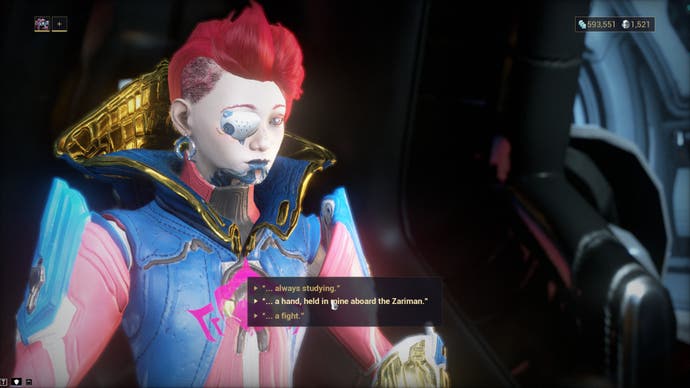
Warframe's actual world building is no more or less complicated, but with Destiny I'm utterly adrift. I've put dozens of hours into it and I couldn't tell you what it's about beyond "something something light versus darkness". Because Destiny's big plot moments don't belong to the player. The player isn't much more than a witness come to observe the machinations of people with actual motivations, buried deep in lore.
By taking the time to anchor the player and give them stakes in what's going on, suddenly I can give context to Warframe's world in a way I've never been compelled to with Destiny. Warframe doesn't go broad, it goes specific. It's not good versus evil, light versus dark but the young and impoverished versus empire and wealth. That it uses devices like a character creator to further that story give it a potency that's impressive far beyond the realm of free to play or loot shooters. It's a genuinely great, delicately handled moment.
If you'd told me when Warframe first came out that it would eventually deliver one of my all-time favourite bits of video game storytelling, I would have laughed. It's unbelievable. But here we are and Warframe proves that any genre, even one as seemingly antithetical to good storytelling as a grindy loot shooter, can be elevated to something far more meaningful.
